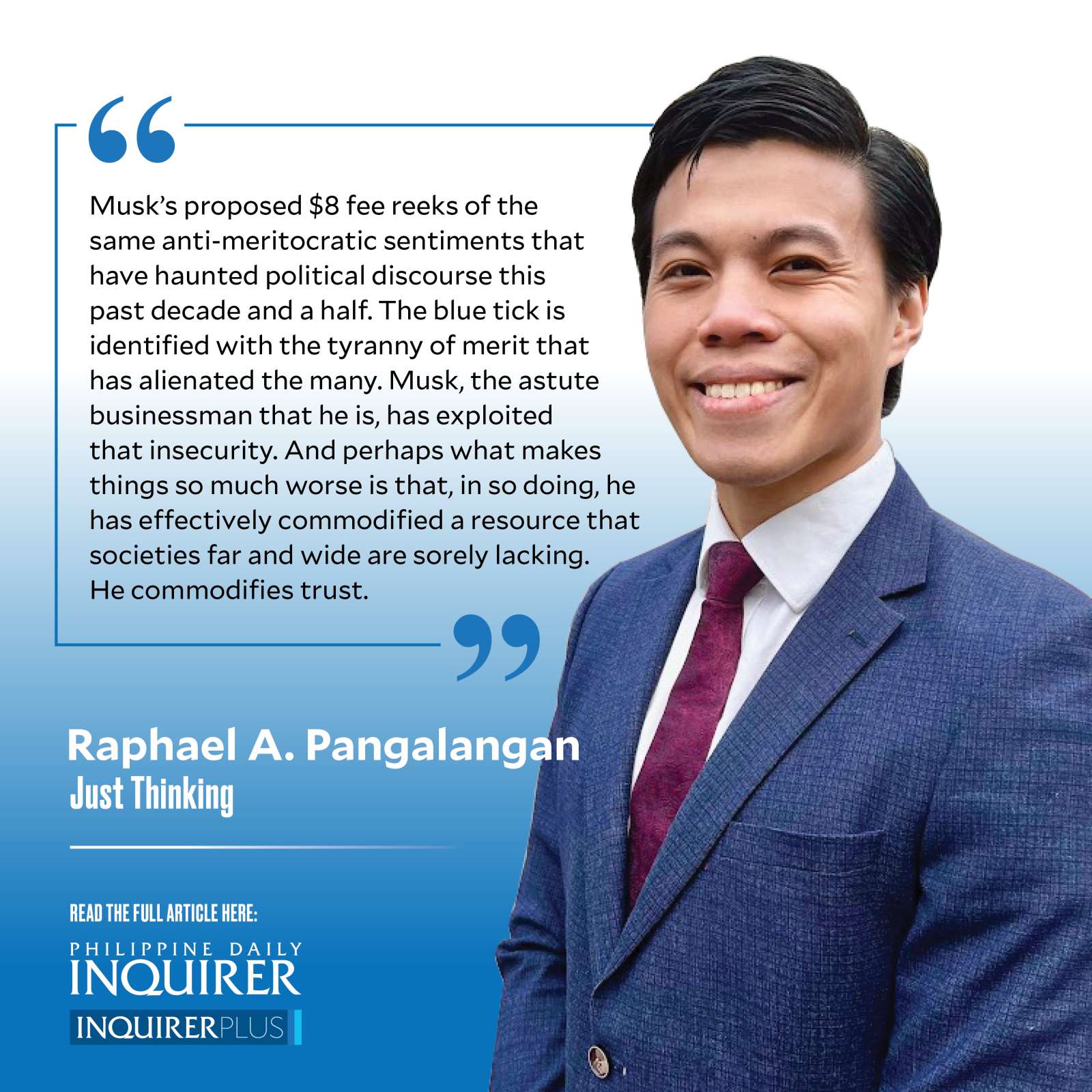Free speech for sale: $8 only
What’s all this hullabaloo over a blue check mark?
If you’ve ever been on Twitter—the social media platform well-known for its bite-sized, 280-character “tweets”—chances are you would have noticed a blue check mark associated with certain accounts. From household personalities like Jose Marie Viceral (@vicegandako) to government officials like President Marcos (@bongbongmarcos), and even institutional accounts such as that of the University of the Philippines (@upsystem) and of the Senate of the Philippines (@senatePH)—right next to their handle (i.e., username) an innocuous tick, no different from an emoji, would immediately follow.
Article continues after this advertisementTo those who haven’t been following the recent developments at the Twitter HQ in San Francisco, California: As of Oct. 27, 2022, Elon Musk—the top 1 of the top 1 percent of the wealthiest people on earth—officially owns Twitter. And all for a measly $44 billion. To underscore that sizable sum, that’s 44 followed by nine zeroes, or about P2,564,927,552,000—almost four times more than the Sy siblings’ wealth combined.
As “Chief Twit,” Musk wasted no time in changing the company inside out. He hit the ground running, fast-tracking changes to Twitter’s homepage and giving the company’s leadership a sudden makeover, firing the CEO, CFO, general counsel, and head of legal, trust, and safety. But among this string of controversial decisions, Musk’s latest announcement is the one (thus far) that trickles downstream, closest to home.
It brings us back to where this column began.
Article continues after this advertisementOn the afternoon of Nov. 1, 2022, Musk announced that Twitter account holders will need to cough up $96/year for the verification badge. (Initially, it was pegged at $240/year, but was eventually brought down thanks to a tweet by legendary storyteller Stephen King.)
This most recent announcement has been met with waves of mixed feelings. Among those who support it (aka the “Musketeers”), some would claim that the badge-for-a-fee setup is prodemocratic. They see money as the great leveler and the subscription fee as their weapon of choice against the tyranny of “lords” over “peasants.” Lords who have hitherto decided who hath and hath not the coveted blue check. Echoing Muskian mantra, they cry: “Power to the people! Blue for $8/month.”
I take a different view. This is not the end of tyranny. It is its beginning.
You see, Musk and his supporters appear to think that the blue check mark is some sort of status symbol. And that by tacking the blue badge of verification next to their name, the badged “lord” was effectively signaling their moral or intellectual superiority over us non-badged “peasants.” In gist, the Musketeers associate Twitter’s verification check with merit. To them, the check was a flex.
But the Musketeers are mistaken. The blue tick on Twitter is not meant to signify excellence but authenticity. And what is authentic is not always excellent.
Similarly, the blue check is a symbol signaling that the person behind the account is not some imposter pretending to be someone else. That the accounts of celebrities are indeed their own.
But here’s the rub: Though the primary function of the verification badge is to simply verify, it has over time been associated with so much more. This is spelled out by no less than Twitter itself. Its online Help Center provides that “for a Twitter account to be verified it has to meet three main criteria: it has to be authentic, notable, and active.” Notably, notable accounts are those associated with a “prominent individual, brand, organization, or agency.” Further, to be active, “the account should not have violated the Twitter rules.”
The Help Center proceeds to state that “a verified Twitter account is a big deal.” That with it, “you are more likely to be taken seriously” because the “content might be more trustworthy, since they have gone through the verification process.” It says that the “blue tick is regarded as an identifier of value and, as such, tweets from a verified account are considered worth engaging with.” Finally, it clarifies that though the blue tick is not Twitter’s endorsement, “the fact that it is giving the tick so selectively shows that you had to pass some kind of test to get it.”
Musk’s proposed $8 fee reeks of the same anti-meritocratic sentiments that have haunted political discourse this past decade and a half. The blue tick is identified with the tyranny of merit that has alienated the many. Musk, the astute businessman that he is, has exploited that insecurity. And perhaps what makes things so much worse is that, in so doing, he has effectively commodified a resource that societies far and wide are sorely lacking. He commodifies trust.
Perhaps we could all ask @Stephenking to tweet @Elonmusk one more time in order to bring the fees down to $0.99 per month, but that would be beside the point. It’s not the price, but the tag. It’s the fact that, at this point in history where the world lays witness and is helpless to the destructive power of deceit, the richest man in the world decided to make a quick buck by putting a price tag on truth.
——————
thinkjustly@gmail.com

















